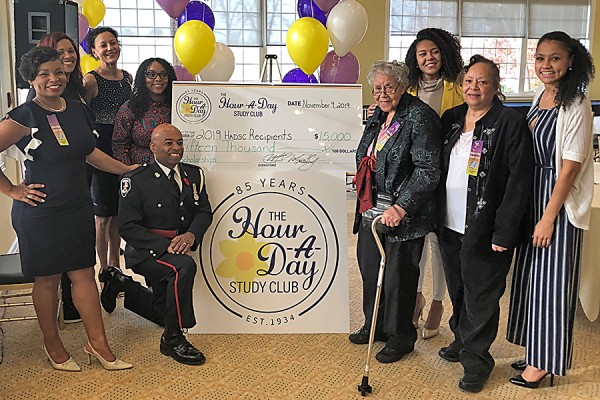 The Hour-A-Day Study Club celebrated its 85th anniversary in 2019. The women’s group offers scholarships and bursaries to Black students to help them to pursue post-secondary education.
The Hour-A-Day Study Club celebrated its 85th anniversary in 2019. The women’s group offers scholarships and bursaries to Black students to help them to pursue post-secondary education.
Fifty dollars changed the course of Phil Alexander’s life.
The year was 1959 and Alexander had just graduated from Patterson Collegiate in Windsor. His wife had given birth to their first son during his Grade 13 year and Alexander, who says he was looking to "make good on marrying so young,” was weighing his responsibilities.
He had earned the highest score in the province on a mathematics exam that, but for the colour of his skin, would have guaranteed him a job at any accounting firm. Against the odds for a Black teen, he had secured a job offer in Hamilton at aircraft manufacturer A. V. Roe Canada, better known as Avro. But a scholarship from a group rooted in the local Black community — and his parents’ insistence that he couldn’t let that money go to waste — sent him to university instead.
He went on to become UWindsor’s associate dean of engineering.
Alexander’s scholarship — of $50 — came from the Hour-A-Day Study Club, a Black women’s association founded in 1934. It was their mission as matriarchs of the local Black community to help youth succeed.
The group, the oldest of its kind in Canada, is still going strong. The 13 current members focus on the same causes their great-grandmothers and other female ancestors did.
“Dismantling anti-Black racism and advancing the cause of education are at the core of the Hour-A-Day Study Club’s work,” said club president Marium Tolson-Murtty, UWindsor’s strategic planning officer on anti-Black racism initiatives.
“Our efforts to raise funds for scholarships and bursaries help eliminate potential barriers Black youth face in pursuit of post-secondary education. This work is vital to the preservation of the legacy of the trailblazing women who started this organization.”
When first established, the group was known as the Mother’s Club.
“The club's name eventually changed to the Hour-A-Day Study Club to convey the notion that if you spend at least one hour a day on something that is of interest to you, you will soon be able to master that skill over time,” Tolson-Murtty explained.
It later took on the informal name DOTUR, short for Daughters of the Underground Railroad, a name coined by former club president Gloria Hidi (BA 1975).
“The women spent much of their time nurturing the youth in the community and advocating with families on issues such as equitable access to education and working against segregation in Ontario schools,” said Tolson-Murtty.
The group holds raffles and, in pre-COVID years, hosted pancake breakfasts and other fundraisers to raise money for scholarships and bursaries. In the past 15 years alone, it has distributed more than $150,000.
The largest scholarship, awarded to the student with the best academic standing coming out of high school each year, is named for Alexander’s wife, Pat. Until her death in 2013, Pat Alexander had been a long-time member and a past-president of the Hour-A-Day Study Club. Using an inheritance from her aunt who had had a distinguished military career in the United States, her bequest also funds two additional bursaries. One is for a student pursuing a military or policing career and another, in honour of a dear friend who had a restaurant on Maiden Lane in Windsor, for a student pursuing a career in the culinary arts.
Despite never graduating elementary school, Pat Alexander was an accomplished woman. In addition to raising five children, she was a tireless community volunteer. She chaired the Windsor Police Commission, was first-vice president of the Multicultural Council of Windsor and Essex County, and was a director of Windsor and Essex County Crime Stoppers.
Her daughter Patty (BComm 1994) and granddaughter Tricia have followed in her footsteps and are among the Hour-A-Day Study Club’s current members.
The club is part of local Black history and its future, said Tolson-Murtty. Its meeting minutes spanning 10 decades and other archival material is housed at the Amherstburg Freedom Museum. Included are the meeting minutes from April 4, 1968.
“This extraordinary piece of information reveals the precise moment the women stopped the meeting and said a prayer in recognition of live news broadcast reports of the assassination of Rev. Dr. Martin Luther King, Jr.,” Tolson-Murtty said. The club went on to send a telegram expressing its members’ condolences to King’s family.
The group has sponsored annual cultural events featuring internationally renowned entertainers. It has hosted high teas for the likes of education pioneer Mary McLeod Berthune and Shirley Chisholm, the first Black woman to run for president of the United States. The members also lent their voices to the civil rights movement in the 1950s and ’60s.
“These hardworking, dedicated, and modest women were faithful matriarchs in their homes, churches, and community,” Tolson-Murtty said. “The dedicated efforts of these women have been passed down generation after generation. It’s imperative to recognize their contributions and place in Canadian history.”
—Sarah Sacheli

